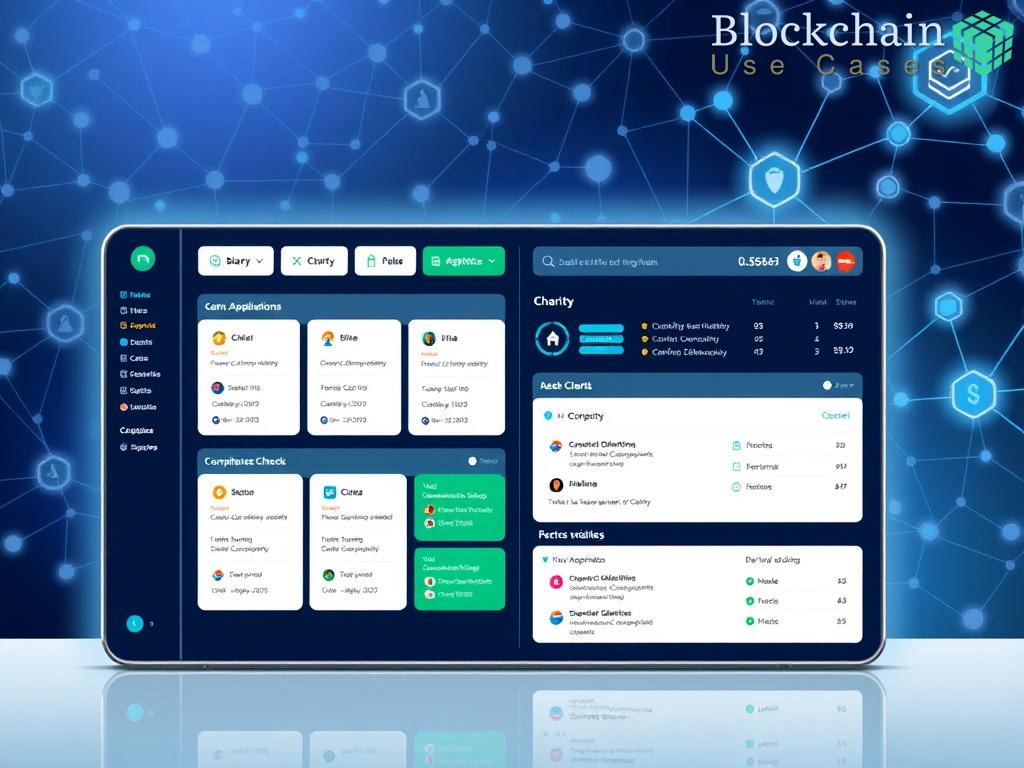Unlocking Transparency: Blockchain’s Promise for Charities

In an era where transparency is paramount, blockchain technology emerges as a beacon of hope for charities around the globe. Traditional registration processes can often be tedious, opaque, and fraught with inefficiencies. Using blockchain, charities can streamline their registration, making it faster and more reliable than ever before.
Blockchain offers a decentralized ledger that records every transaction in a secure and immutable manner. This means that once registered, a charity’s details cannot be altered without consensus from all parties involved, ensuring authenticity and trust.
Compliance in the charity sector is essential, yet it often becomes a complex labyrinth that organizations must navigate. Blockchain technology simplifies compliance processes, allowing charities to easily track donations and expenditures while meeting regulatory requirements. This transparency not only builds trust with donors but also with regulatory bodies.
By leveraging smart contracts, charities can automate compliance checks. These self-executing contracts ensure that funds are used for their intended purposes, making misuse virtually impossible. This fosters an environment of accountability, where every transaction is traceable and verifiable.
The potential of blockchain extends beyond registration and compliance; it revolutionizes the entire landscape of charitable giving. Imagine a world where donors can see the impact of their contributions in real-time, thanks to blockchain’s tracking capabilities. This level of transparency can significantly enhance donor engagement and loyalty.
Consider the following advantages of blockchain for charities:
- Enhanced Trust: Donors can verify the allocation of funds, knowing exactly where their money is going.
- Reduced Operational Costs: Automating processes means less administrative overhead and more funds directed toward charitable activities.
- Global Reach: Blockchain’s borderless nature enables charities to accept donations from anywhere in the world, broadening their support base.
As we look ahead, the integration of blockchain technology in the charity sector promises not just efficiency but a profound transformation in how charities operate and engage with their supporters.
Efficient Registration: How Blockchain Simplifies Compliance

In the quest for greater efficiency and transparency, the charity sector stands to gain immensely from the implementation of blockchain technology. The cumbersome and often convoluted processes that have historically plagued charity registration can be transformed into a streamlined experience. Blockchain not only provides a secure framework for recording vital information but also ensures compliance with regulatory requirements without the typical red tape associated with traditional methods.
Imagine a world where registering a charity is as simple as a few clicks, devoid of mountains of paperwork and waiting periods. Blockchain facilitates this by creating a decentralized platform where all necessary documentation is stored securely and is easily accessible. This eliminates the risk of data loss and fraud associated with traditional paper records.
Compliance is not just about registration; it encompasses ongoing obligations that charities must adhere to. With blockchain, charities can leverage real-time tracking of their activities. Each step of their operations is logged in an immutable ledger, allowing both internal and external stakeholders to monitor compliance effortlessly. This transparency not only aids in adhering to legal requirements but also builds confidence among donors and regulatory bodies alike.
To better understand the transformative impact of blockchain on charity registration and compliance, consider the following advantages:
- Streamlined Processes: Blockchain reduces the time required for registration, allowing charities to focus more on their mission.
- Cost-Effective Solutions: By minimizing administrative burdens, funds can be redirected towards charitable initiatives.
- Enhanced Accountability: Every transaction is recorded, providing a clear trail that ensures that funds are used appropriately.
- Global Accessibility: Charities can reach potential donors worldwide without geographical limitations.
As the world embraces digital transformation, the integration of blockchain technology in the charity sector not only promises efficiency but also fosters a culture of trust and accountability, making it an exciting prospect for the future of charitable giving.
Decentralized Trust: Building Confidence in Charity Operations
In the ever-evolving landscape of charitable organizations, trust stands as a pivotal element that can make or break the relationship between a charity and its donors. As skepticism about charitable operations grows, the need for a robust framework that fosters confidence is more crucial than ever. Enter blockchain technology—a transformative force that not only promises increased efficiency in registration and compliance but also redefines the very essence of trust within the charity sector. This decentralized technology empowers charities to operate in an environment where transparency is not just an option but a fundamental principle.
At the heart of blockchain’s contribution to trust-building is its decentralized nature. Unlike traditional systems that rely on a central authority for verification, blockchain operates on a network of independent nodes that collectively maintain the integrity of the data. This means that no single entity can manipulate or alter the information without the consensus of others, creating an unassailable foundation for confidence in charity operations. As a result, stakeholders—including donors, regulators, and beneficiaries—can independently verify the legitimacy of a charity’s activities, thus fostering a sense of security.
Donors today are more informed and discerning than ever. They demand more than just a compelling mission statement; they seek to understand how their contributions are being utilized. Blockchain technology addresses this need head-on by enabling real-time tracking of donations and expenditures. Imagine a donor being able to see, at any moment, the exact path their funds take—from the moment they are donated to the final impact on the ground. This level of transparency not only enhances donor engagement but also solidifies confidence in the charity’s operations. The ability to access and review transaction history instills a sense of empowerment among donors, making them feel like active participants in the charity’s mission rather than passive contributors.
Beyond transparency, blockchain fosters a culture of accountability that is essential for the long-term sustainability of charities. Each transaction recorded on the blockchain is immutable and time-stamped, creating an undeniable trail of actions that can be audited at any time. This traceability serves as a powerful deterrent against fraud and mismanagement, ensuring that funds are utilized as intended. Furthermore, by instituting smart contracts, charities can automate compliance checks, thereby minimizing human error and enhancing operational integrity. These contracts can be programmed to release funds only when certain conditions are met, ensuring that every dollar spent aligns with the charity’s mission and objectives.
As more organizations adopt blockchain technology, the charity sector will witness a paradigm shift in how trust is established and maintained. This decentralized approach not only addresses the pressing issues of transparency and accountability but also cultivates a community of engaged and trusting donors. In this new era of charitable giving, the integration of blockchain is not just a technological advancement; it is a movement towards a more trustworthy and accountable charity landscape.
Real-Time Monitoring: Enhancing Accountability with Blockchain
In the landscape of charitable organizations, accountability is no longer a luxury but a necessity. With the rise of technology, especially blockchain, the ability to monitor and ensure the proper use of funds has reached unprecedented levels. By harnessing the power of real-time monitoring, charities can not only safeguard their resources but also build lasting relationships with their donors based on trust and transparency.
The advent of blockchain technology introduces a revolutionary approach to how charities track their transactions and activities. Real-time monitoring allows stakeholders to observe every movement of funds and resources, effectively eliminating the ambiguity that has historically plagued the sector. This feature is vital for building confidence among donors, as they can see firsthand how their contributions are utilized.
Implementing real-time monitoring through blockchain translates into numerous advantages for charitable organizations, enhancing both their operational efficiency and accountability. Below, we outline the transformative benefits:
- Immediate Access to Data: Donors and stakeholders can access up-to-date information, ensuring they are informed about the status of their contributions at any moment.
- Instant Audit Trails: Each transaction is logged in real-time, creating an instantaneous audit trail that can be reviewed at any time.
- Fraud Prevention: With constant monitoring, the likelihood of mismanagement or fraudulent activities is significantly reduced.
- Enhanced Decision-Making: Charities can quickly adjust their strategies based on real-time data, optimizing their impact and resource allocation.
By integrating blockchain’s real-time monitoring capabilities, charities can cultivate a culture of transparency that empowers donors. The ability to track their contributions fosters a sense of ownership among supporters, transforming them from passive participants to active stakeholders in the charitable mission. This engagement can enhance donor loyalty and encourage repeat contributions, ultimately benefiting the charity’s sustainability.
| Feature | Traditional Monitoring | Blockchain Monitoring |
|---|---|---|
| Data Accessibility | Delayed Reporting | Instant Access |
| Audit Process | Periodic Audits | Continuous Auditing |
| Fraud Detection | Reactive Measures | Proactive Monitoring |
| Donor Engagement | Limited Insights | Real-Time Updates |
As we move forward, the integration of blockchain technology and its real-time monitoring capabilities is set to redefine accountability in the charity sector. This evolution will not only enhance operational integrity but also fortify the trust that is so essential for the success and sustainability of charitable organizations.
Smart Contracts: Automating Charity Processes for Efficiency
As the charity sector grapples with the challenges of operational inefficiencies and compliance burdens, smart contracts have emerged as a revolutionary solution. Leveraging the capabilities of blockchain technology, these self-executing contracts offer a transformative way to automate processes, ensuring that charities can operate with enhanced efficiency and accountability.
Envision a scenario where charities no longer need to manually verify compliance at every step of their operations. With smart contracts, this tedious task is streamlined. These contracts automatically execute predefined actions once certain conditions are met, eliminating the need for intermediaries and reducing the potential for human error. For instance, a charity can set up a smart contract that releases funds only when specific milestones are achieved, ensuring that resources are allocated effectively and transparently.
Smart contracts operate on a decentralized network, making them immune to tampering and fraud. Each contract is coded with the stipulations that govern its execution, and once deployed, it functions autonomously. This autonomy leads to a significant reduction in operational costs, as charities can minimize administrative overhead while maximizing the impact of their initiatives.
Moreover, the instantaneous nature of smart contracts means that every transaction is recorded in real-time on the blockchain. This immediate logging creates an immutable history of actions, enhancing transparency and accountability. Donors can track their contributions at any moment, observing how funds are allocated and utilized, which builds trust and cultivates ongoing relationships between charities and their supporters.
In addition to operational efficiency, smart contracts also redefine compliance in the charity sector. By automating the monitoring of compliance requirements, charities can ensure adherence to legal standards without the typical burdens of manual oversight. This real-time monitoring not only reduces the risk of non-compliance but also strengthens the organization’s integrity in the eyes of donors and regulatory bodies.
As more charities adopt smart contracts, we can anticipate a significant shift in how charitable organizations manage their operations. This evolution allows charities to focus on their core missions rather than becoming bogged down by administrative tasks. Ultimately, the integration of smart contracts signifies a promising future where efficiency, transparency, and trust converge, paving the way for a more accountable and impactful charity landscape.





